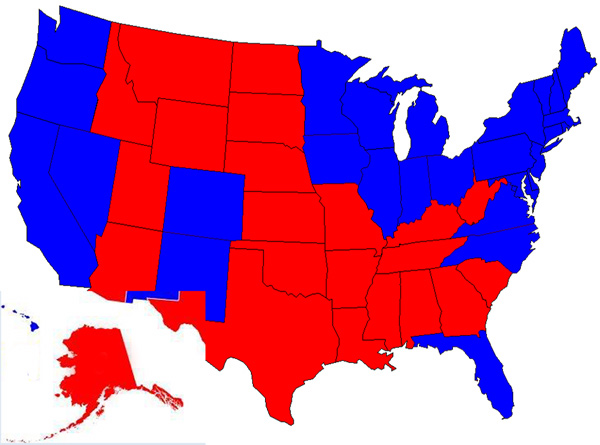Political campaigns are inherently divisive. To win elections, candidates have to draw contrasts, make themselves look good, and their opponents, bad.
Worse still, because the issues are all complex and voters’ attentions short, candidates have to reduce complex ideas to simple slogans and resolve ambiguous gray areas into sharp contrasts between black and white.
In theory, we all come together again after the elections are over. This campaign, however, has made me wonder whether we’ve stopped coming back together and are instead drifting apart into a liberal Blue Nation and a conservative Red Nation that are both losing all perspective about what they have in common and about what divides them.
To see how divided we are now, consider President Barack Obama’s now-notorious campaign speech in Roanoke, Va. — the one in which he famously told entrepreneurs, “you didn’t build that” — and the partisan reactions that followed.
Republicans took umbrage at what they heard as an attack on businesspeople. Democrats cried foul, complaining that the president’s critics took his comments out of context.
The whole speech draws an extended contrast between Obama’s policies and those of his Republican opponents.
Early in the address, Obama explains that in the November election, the voters will make “a decision between two fundamentally different views about where we take the country right now.”
Though we all share the same American Dream that everyone who works hard will have a fair chance at financial success, Obama argues that Republicans and Democrats have very different ideas about how to promote it: “They think that the economy grows from the top down;” the president thinks “the way you grow the economy is from the middle out” and “from the bottom up.”
This contrast frames the controversial portion of the address, where the president states:
“If you were successful, somebody along the line gave you some help. There was a great teacher somewhere in your life. Somebody helped to create this unbelievable American system that we have that allowed you to thrive. Somebody invested in roads and bridges. If you’ve got a business — you didn’t build that. Somebody else made that happen. The Internet didn’t get invented on its own. Government research created the Internet so that all the companies could make money off the Internet.”
Literally and grammatically, the Republicans have the better interpretation of the one notorious sentence: the “that” in “you didn’t build that” and “somebody else made that happen” can only refer to “a business” because “that” is singular, and “a business” is the only possible singular antecedent.
Democrats counter that, since the president went on to add that, “when we succeed, we succeed because of our individual initiative,” we should understand him to have meant that what no individual entrepreneur built or made happen were all the schools and roads and bridges that constitute the American system. This week, the president’s campaign has run ads to stress that he recognizes that “of course Americans build their own businesses.”
Both partisan reactions say a lot about how each side views the other.
A lot of the Republican outrage suggests that their partisan animosity deafened them to the larger context of the president’s speech, leaving them focused on what they were sure was an expression of contempt for individual initiative and achievement.
It was just what a member of the Conservative Red Nation would expect the man they see as a socialist in the White House to say.
On the Democratic reading of the speech, the president was only stating the obvious, that the government has a legitimate and important role in building the infrastructure upon which all depend. But he didn’t speak like a man stating the obvious: he spoke like a man delivering an important truth. On this reading, he must believe that the members of the Progressive Blue Nation think Republicans want no government at all.
Just for the record: The president is not a socialist; he does not favor government ownership of industry, though he has dramatically increased the size and scope of government, and he wants the most successful to pay the bill. Republicans do not want zero government; we favor a limited government.
The real choice between the two parties is not whether government should do anything at all, but over whether it should keep trying to do more. That is an issue big enough to hold elections over, but not so big that we shouldn’t be able to find a way to come together again afterwards.
Joseph R. Reisert is associate professor of American constitutional law and chairman of the department of government at Colby College in Waterville.
Send questions/comments to the editors.



Comments are no longer available on this story